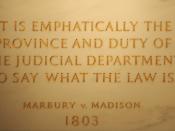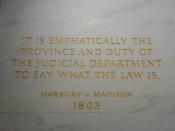Marbury Vs. Madison
In 1800, President John Adams lost his bid for re-election. Thomas Jefferson was voted in for the president. Adams, being a Federalist, disagreed with the beliefs of Jefferson, a republican, and feared that he would shift the power in the government to the states. To prevent this, Adams created many new judicial posts and filled them with Federalists, (Dewey 109). He did this in quite a rush, being he was going to be out of office soon. All the appointments were given to his Secretary of State to be sealed and delivered. Secretary of State Marshall completed all the documents except for the ones for the appointments for the District of Columbia,(Dewey 114). He assumed the next Secretary of State would complete them. When Jefferson found out about this, he was angry. Jefferson ordered the new Secretary of State, James Madison, not to deliver the final appointments to the selected judges.
One of the judges that didn't get his promised appointment was William Marbury. Marbury decided to take action in court.
Marbury's argument was supported by Section thirteen of the Judiciary Act, (Dewey 116). This stated the courts could force an official to perform an official duty. This is called a writ of Mandamus. Marbury took this claim to the Supreme Court. The Chief Justice Marshall of the Supreme Court was James Madison, Adams' old Secretary of State. If he issued the writ, Marshall would ignore it and the court would be perceived as powerless. If he didn't issue it, people would think he was a traitor to his Federalist party, (Dewey 119).
On February 24, 1803 a decision was rendered. It stated that Marbury was entitled to his appointment and that a court could issue a writ of Mandamus. He then went on to say that...


